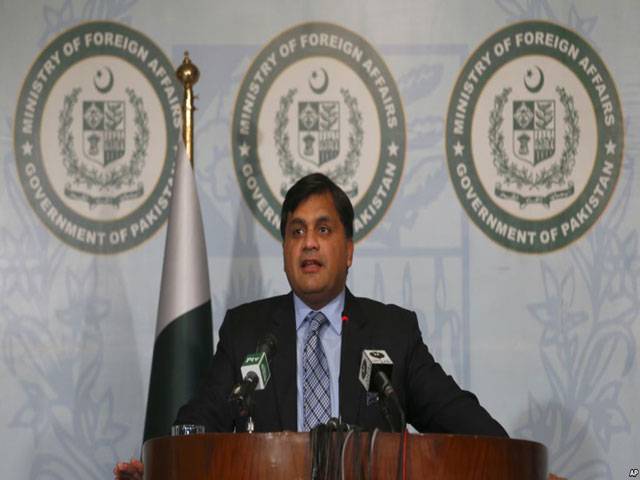ISLAMABAD - Afghanistan’s two-day dialogue with neighbouring Pakistan ended Saturday without progress on issues dividing the two countries and fuelling bilateral tensions, officials said, reported Voice of America (VoA).
Islamabad hosted the meeting of what is named the Afghanistan-Pakistan Action Plan for Peace and Solidarity, or APAPPS. The inaugural round of the Pakistan-initiated dialogue was held in Kabul on February 3.
Foreign Ministry spokesman Mohammad Faisal said the two sides held “good” discussions with “some agreements” but said “further work [was] required”. He did not elaborate.
He said Pakistani Foreign Secretary Tehmina Janjua and Afghan Deputy Foreign Minister Hekmat Khalil Karzai led their respective delegations comprising senior civilian and military officials.
However, an Afghan Foreign Ministry statement issued in Kabul after Saturday’s talks categorically said the discussions made no headway on matters related to deteriorating security in Afghanistan.
“While some progress was made on the mechanism of cooperation, no progress was achieved on specific, results-oriented, time-bound measures in the APAPPS, particularly in the areas of counter terrorism, reduction of violence, peace and reconciliation to meet the priorities of Afghanistan,” according to the statement.
The Afghan government alleges the Taliban use sanctuaries on Pakistani soil to plot insurgent attacks and claimed last month’s bloody attacks in Kabul were planned in the neighbouring country. Afghan officials also shared what they called “evidence” with Islamabad and demanded swift action against the perpetrators.
Pakistan denied any links to the spate of attacks in the Afghan capital and maintains no Taliban sanctuaries are present on its side of the border. Islamabad has also offered to conduct joint investigations into the recent violence.
For its part, Islamabad also alleges militants conducting terrorist attacks in Pakistan use sanctuaries on Afghan soil for plotting the violence. The allegations and counter allegations have plunged bilateral relations to new lows in recent years.
Saturday’s talks also covered subjects such as repatriation of around three million Afghan refugees from Pakistan and joint economic development. Pakistani officials insist the prolonged presence of the refugee community coupled with “inadequate” border security on the Afghan side hamper Islamabad’s counterterrorism efforts.
The United States has also increased pressure on Pakistan to take action against alleged militant sanctuaries, including those of the Haqqani terrorist network. Islamabad asserts the country is being scapegoated for US “failures” to secure Afghanistan.
AHSAN DISCUSSES BILATERAL
TIES WITH US OFFICIAL
WASHINGTON: Interior Minister Ahsan Iqbal Friday called on US Deputy Secretary of State John Sullivan at the Department of State and discussed with him bilateral relations and regional issues.
Speaking on the occasion, Ahsan Iqbal highlighted to the US official the efforts and achievements of Pakistan in defeating terrorism and extremism in the country. He informed the US side that Pakistan’s efforts in this regard were guided by its own National Action Plan (NAP), a coherent and comprehensive strategy based on nation’s vision for a peaceful and prosperous Pakistan.
“The government is committed to continue to make efforts to hand over a peaceful and tolerant Pakistan to the next generations,” remarked the minister. We have achieved internal peace at a huge cost in blood and resources,” added the minister.
The minister also informed the deputy secretary about the economic revival in the country which was a result of the internal peace in the country and the government’s sustained policy of economic development of Pakistan.
Ahsan underscored the need for Pakistan and the US to evolve a joint framework for peace in the region based on legitimate mutual security concerns of the two countries in the region. Peace and stability of Afghanistan is vital for Pakistan’s progress and development while some regional elements see instability in Afghanistan as a pressure on Pakistan’s security apparatus and act as spoilers in efforts for restoration of peace.
Deputy Secretary of State Sullivan agreed that cooperation between Pakistan and the United States was key to peace and stability in the region.






